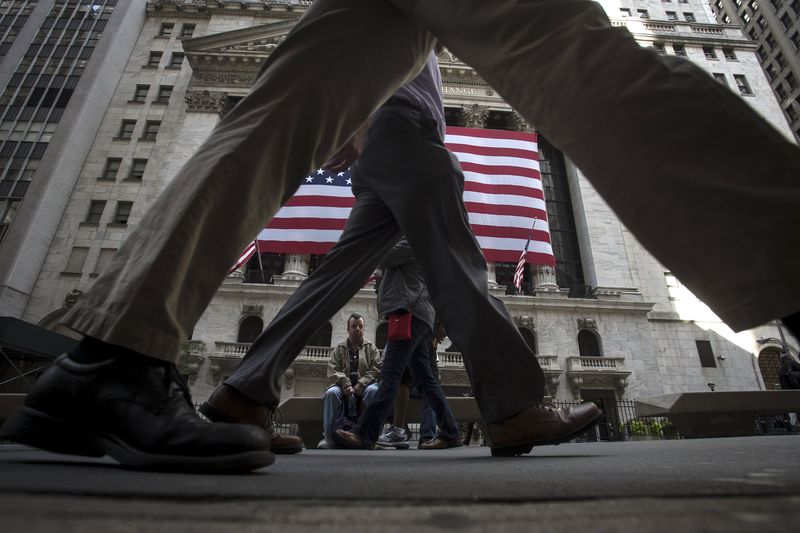
© Reuters.
Investing.com — Major U.S. banks begin to deliver their second-quarter earnings reports, with investors keen to see how they have managed to weather the turmoil in the sector earlier this year. Elsewhere, U.S. regulators continue their legal push to temporarily halt the massive tie-up between Microsoft and Activision Blizzard, while Hollywood actors go on strike.
1. Big banks report
The banking sector crisis that began earlier this year showed signs of subsiding, but the jury is still out on whether it has completely come to an end.
A series of second quarter results from the largest U.S. lenders — beginning with JPMorgan Chase (NYSE:), Wells Fargo (NYSE:), and Citigroup (NYSE:) on Friday — could bring more clarity to this question.
Investors are thought to be keeping a particularly close eye on net interest margin: The difference between how much a bank makes from loans and securities and pays out for liabilities like deposits.
Higher interest rates, which typically push up interest payments, are anticipated to have boosted bank returns. But demand for loans has cooled, while banks have had to spend more to entice anxious customers to stick with their accounts instead of moving to higher-yielding money market funds. Net interest margin may be squeezed as a result.
At the same time, lucrative dealmaking has hit a dry patch and new capital requirements may force banks to pull back on lending. However, analysts expect that the biggest banks will still maintain solid results.
2. U.S. futures mixed ahead of bank earnings
U.S. stock futures were mixed on Friday, but hovered broadly around the flatline, as traders geared up for the first batch of bank earnings.
At 05:24 ET (09:24 GMT), the contract had slipped by 35 points or 0.10%, edged down 2 points or 0.06%, and added 2 points or 0.01%.
The major indices ended the previous session in the green after data showed that producer price growth in the U.S. eased by more than anticipated in June. The figure, along with a softer-than-expected monthly on Wednesday, bolstered projections that the will soon back away from its long-standing policy tightening cycle.
On a weekly basis, the broad-based heads into today’s trading up 1.9% and the benchmark has gained 2.5%. Meanwhile, the tech-heavy has jumped 3.5%, putting it on course for its best week since March.
3. FTC makes new attempt to halt Microsoft-Activision mega-merger
The Federal Trade Commission is looking for a new injunction, preventing the completion of Microsoft’s (NASDAQ:) acquisition of Activision Blizzard (NASDAQ:), marking the latest development in the long-running courtroom drama over what would be the largest deal in the history of the video game industry.
Earlier this week, federal Judge Jacqueline Scott Corley in San Francisco rejected a similar request from the FTC, saying the agency failed to show that the tie-up would break antitrust law. The FTC later appealed the ruling.
On Thursday, the FTC asked the same court to block the merger until the appeals court reached its own decision. Corley denied the request.
Microsoft is in a race to complete the deal before its standing agreement with “Call of Duty” maker Activision expires on July 18. After that date, either business can step away from the merger if they cannot negotiate an extension.
4. Picket lines in Tinseltown
Hollywood actors have joined screenwriters in a strike for the first time in over six decades following failed talks with major studios, shuttering production in the film and TV industry.
SAG-AFTRA, which represents over 160,000 television and film actors in Hollywood, voted to stop work at midnight in Los Angeles. The union is calling for better pay and working conditions from both studios and streaming giants, while also demanding protections from the use of digital replicas created by artificial intelligence.
As long as the strike is in progress, actors cannot appear in films or promote work that has not already been completed. Stars Cillian Murphy, Matt Damon, and Emily Blunt subsequently left the red carpet premiere of “Oppenheimer” in London on Thursday early.
The group representing the studios and streaming services said the strike was not their desired outcome, warning that it will lead to “financial hardship for countless thousands of people who depend on the industry.” Disney boss Bob Iger, meanwhile, told CNBC that it comes at the “worst time in the world,” with Hollywood still trying to rebound from the pandemic.
5. Oil on pace for weekly gains
Oil prices were on track to post gains for the third straight week despite slipping marginally on Friday, as supply disruptions in Libya and Nigeria added to hopes for resilient U.S. demand.
At 05:24 ET, the futures traded 0.25% lower at $76.70 a barrel, while the dipped by 0.21% to $81.19 per barrel.
Several Libyan oil fields, including the country’s second largest, Sharara, were shut down on Thursday, while a suspected pipeline leak suspended exports from Nigeria’s Forcados terminal.
These disruptions in supply follow last week’s announcement of additional output cuts by Saudi Arabia and Russia and point to tighter oil markets in the coming months.
Elsewhere, the recent inflation readings out of the U.S. have fueled expectations that the Federal Reserve will soon back away from interest rate rises, which could help bolster demand in the world’s top oil consumer.





